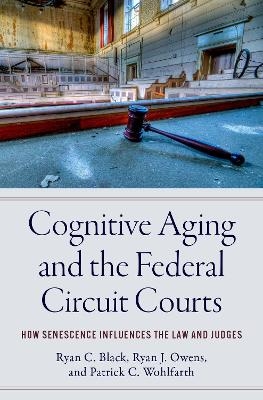
Cognitive Aging and the Federal Circuit Courts
Oxford University Press Inc (Verlag)
978-0-19-774702-5 (ISBN)
- Lieferbar (Termin unbekannt)
- Versandkostenfrei innerhalb Deutschlands
- Auch auf Rechnung
- Verfügbarkeit in der Filiale vor Ort prüfen
- Artikel merken
In the United States, federal judges occupy weighty positions. They interpret the Constitution, define people's rights and liberties, and apply laws and regulations to myriad cases. They also are older than ever. In 2023, the median age of a federal judge reached 70 for the first time. Nearly one-third of federal judges exceeded the age of 75. And ten percent were 85 years or older. The federal judiciary has become a graying judiciary.
Recent advances in neuroscience show that cognitive aging leads to processing speed delays, a decline in executive functioning skills like reasoning and memory, and a greater reliance on cognitive shortcuts. Judges are not immune from these effects. Simply put, cognitive aging influences all people. Judges are people. And so cognitive aging must influence them.
In Cognitive Aging and the Federal Circuit Courts: How Senescence Influences the Law and Judges, a distinguished team of authors investigates how cognitive aging influences federal circuit court judges. The first-of-their-kind results show that as judges age, they require more time to craft their opinions; they rely more on cognitive shortcuts; their opinions become less complex; they increasingly rely on others to help them write opinions; and their legal influence on panels wanes just as their susceptibility to persuasion increases. These results are sure to transform broad debates about institutional reform.
Ryan C. Black is Professor of Political Science at Michigan State University and a faculty affiliate with the Michigan State University College of Law. He studies judicial politics in the U.S. with a focus on decision making in the U.S. Supreme Court, and the U.S. Courts of Appeals. Ryan J. Owens is Professor of Political Science at the University of Wisconsin-Madison. Owens studies law and courts and American political institutions. His work analyzes the United States Supreme Court, the United States Courts of Appeals, legal institutions, and judicial behavior. Patrick C. Wohlfarth is Professor of Government and Politics at the University of Maryland, College Park. His research focuses on law and courts in the United States, including executive branch litigation, external influences on judicial behavior, and interinstitutional politics.
1. Introduction
2. The Neuroscience Behind Cognitive Aging
3. How Cognitive Aging Applies to Judges
4. Opinion Crafting and Cognitive Aging
5. Opinion Style
6. Cognitive Aging, Law Clerks, and Party Briefs
7. Aging, Opinion Quality, and the Diffusion of Precedent
8. Cognitive Aging and Following Supreme Court Precedent
9. Cognitive Aging and Panel Composition
10. Public Attitudes Toward Aged Judges
11. Public Support for Judicial Reforms
12. Conclusion
| Erscheinungsdatum | 28.10.2024 |
|---|---|
| Verlagsort | New York |
| Sprache | englisch |
| Maße | 150 x 226 mm |
| Gewicht | 499 g |
| Themenwelt | Geisteswissenschaften ► Psychologie ► Verhaltenstherapie |
| Recht / Steuern ► Allgemeines / Lexika | |
| Recht / Steuern ► EU / Internationales Recht | |
| ISBN-10 | 0-19-774702-7 / 0197747027 |
| ISBN-13 | 978-0-19-774702-5 / 9780197747025 |
| Zustand | Neuware |
| Informationen gemäß Produktsicherheitsverordnung (GPSR) | |
| Haben Sie eine Frage zum Produkt? |
aus dem Bereich


